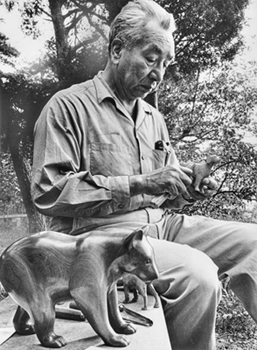Cherokee Indians
Part i: Overview; Part ii: Cherokee origins and first European contact; Part iii: Disease, destruction, and the loss of Cherokee land; Part iv: Revolutionary War, Cherokee defeat and additional land cessions; Part v: Trail of Tears and the creation of the Eastern Band of Cherokees; Part vi: Federal recognition and the fight for Cherokee rights; Part vii: Modern-day Cherokee life and culture; Part viii: References and additional resources
Part i: An overview
 Cherokee Indians once occupied an area encompassing approximately 140,000 square miles that became parts of North Carolina, Tennessee, South Carolina, Georgia, and Alabama. The Cherokee thrived in North Carolina well into the late eighteenth century, but as Euro-American settlers steadily moved into and near Cherokee lands, sharp conflicts arose between Cherokees and whites and between Cherokees themselves, as leaders with competing claims to speak for the tribe secured treaties and formed other agreements with white settlers that were not acknowledged by all Cherokee people. In 1838-39, the U.S. government forcibly removed the Cherokee from their lands in North Carolina, leading them on the infamous Trail of Tears to the Indian Territory (present-day Oklahoma). A small number of Cherokee people successfully resisted removal, however, by claiming North Carolina citizenship and by maintaining the right to remain on lands they owned. These people and their descendants were recognized in 1868 by the federal government as the Eastern Band of Cherokee Indians. In the early 2000s these Cherokee, living on the Qualla Boundary in the western part of the state, were the only Indian tribe in North Carolina fully recognized by the federal government. The tribe has more than 13,000 enrolled members.
Cherokee Indians once occupied an area encompassing approximately 140,000 square miles that became parts of North Carolina, Tennessee, South Carolina, Georgia, and Alabama. The Cherokee thrived in North Carolina well into the late eighteenth century, but as Euro-American settlers steadily moved into and near Cherokee lands, sharp conflicts arose between Cherokees and whites and between Cherokees themselves, as leaders with competing claims to speak for the tribe secured treaties and formed other agreements with white settlers that were not acknowledged by all Cherokee people. In 1838-39, the U.S. government forcibly removed the Cherokee from their lands in North Carolina, leading them on the infamous Trail of Tears to the Indian Territory (present-day Oklahoma). A small number of Cherokee people successfully resisted removal, however, by claiming North Carolina citizenship and by maintaining the right to remain on lands they owned. These people and their descendants were recognized in 1868 by the federal government as the Eastern Band of Cherokee Indians. In the early 2000s these Cherokee, living on the Qualla Boundary in the western part of the state, were the only Indian tribe in North Carolina fully recognized by the federal government. The tribe has more than 13,000 enrolled members.
The Eastern Band of the Cherokee Indians is self-governed and autonomous. Governance is by tribal council. The Principal Chief as of 2018 was Richard Sneed. His name is the latest in the list of Cherokee leaders, his predecessors being Yonaguska, William Holland Thomas, Salonitah (or Flying Squirrel), Lloyd R. Welch, Nimrod Jarrett Smith, Stillwell Saunooke, Andy Standing Deer, Jesse Reed, Bird Saloloneeta (or Young Squirrel), John Goins Welch, Joseph A. Saunooke, David Blythe, Sampson Owl, John A. Tahquette, Jarret Blythe, Henry Bradley, Osley Bird Saunooke, Walter Jackson, Noah Powell, John A. Crowe, Robert S. Youngdeer, Jonathan L. Taylor, Gerard Parker, Joyce Dugan, Leon Jones, Michell Hicks, and Patrick Lambert.
Keep reading > Part ii: Cherokee origins and first European contact 
Resources:
Eastern Band of Cherokee Website: https://ebci.com/
1 January 2006 | Anderson, William L. ; Bell, John L., Jr.; Wetmore, Ruth Y.